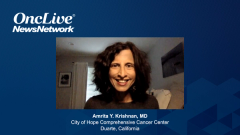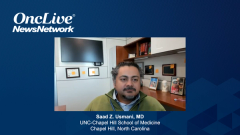
ASH 2021: Additional Highlights in Multiple Myeloma
Saad Usmani, MD, shares his excitement for additional clinical trial data in multiple myeloma presented at the ASH 2021 annual meeting.
Episodes in this series

Transcript:
Saad Z. Usmani, MD: I think one of the areas of unmet need right now is our triple-class refractory patients, the patients’ refractory to PI-IMiD [proteasome inhibitor-immunomodulatory drug] and anti-CD38 monoclonal antibody. From the MAMMOTH data set, we know that the median PFS [progression-free survival] for those patients is less than 3 months. The median OS [overall survival] is less than 9 months for those patients. It was very encouraging to see several bispecific antibodies being presented. There were several that were targeting BCMA, so we were seeing more mature data with each of those. We saw updated data from teclistamab, updates from elranatamab. We saw updates from the GPRC5D- targeting talquetamab, and then cevostamab, which is targeting FcRH5. Then there were data from Regeneron [Pharmaceuticals], a BCMA bispecific antibody as well, and the Teneobio experience with their BCMA bispecific. The BCMA-directed bispecifics are showing high overall response rates, ranging from between 60% to the mid-80% range. A high proportion of these patients were triple-class refractory. The same was true for cevostamab, showing an overall response rate of about 56%, 57%. Talquetamab is showing high response rates as well.
Another couple of studies that were reported were subcutaneous [subq] daratumumab being combined with subq [subcutaneous] teclistamab and subq talquetamab in patients with relapsed/refractory multiple myeloma, showing good tolerability, good safety, and very high response rates, well over 80%. They are very encouraging data. Now, we are heading into an era where we may be combining antibody-based therapies, potentially even without an IMiD or a PI in the scheme of things, so it’s quite exciting to see some of these IO [immune-oncology]-based combinations looking at these early data. Obviously, we have to do larger randomized studies to see how they compare with the standard of care, but these early data were quite encouraging.
Another space where I was quite interested in seeing data were the CAR [chimeric antigen receptor] T-cell therapies. We saw the 2-year follow-up update from ciltacabtagene autoleucel from CARTITUDE-1 which continues to impress everyone. At the 2-year median follow-up, the CR [complete response] or better rate is now 83%, which is quite impressive and the median PFS is still not reached. I think the 2-year PFS percentage was 60.5%. Very impressive data, no new safety signals that were observed, and we actually got a glimpse of the allogeneic BCMA CAR T, the ALLO-715 product, showing good activity, an overall response rate of 71% in the higher dose cohorts. Then we also saw new results, first time being reported, of the GPRC5D-directed CAR T cells from the MSK [Memorial Sloan Kettering Cancer Center] program. We saw good safety of that product and overall response rate in a highly refractive patient population, more than half the patients had high-risk cytogenetics. I think a third of the patients had progressed on a BCMA-directed CAR T-cell therapy as well. The response rates with that product were well over 70% across the different cohorts, which was quite encouraging to see.
Those were the most exciting abstracts. I believe I’ve already highlighted in the newly diagnosed setting that I was very interested in hearing about the quadruplet regimens and how they’re performing in different trials.
Transcript edited for clarity.






































